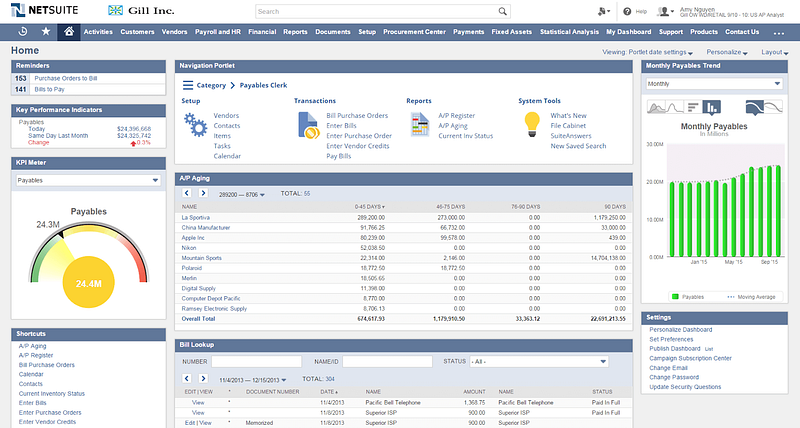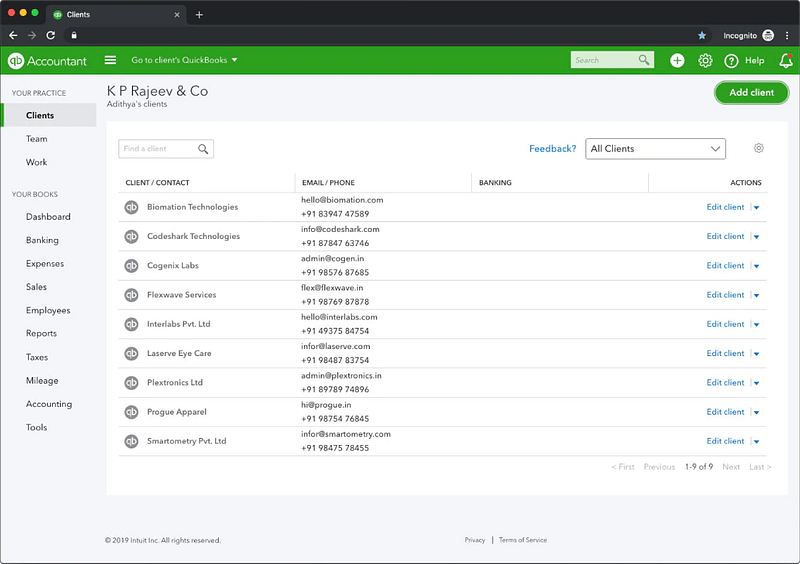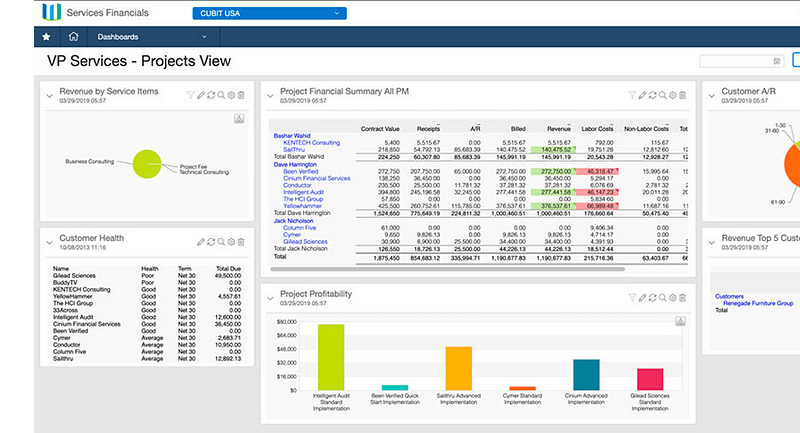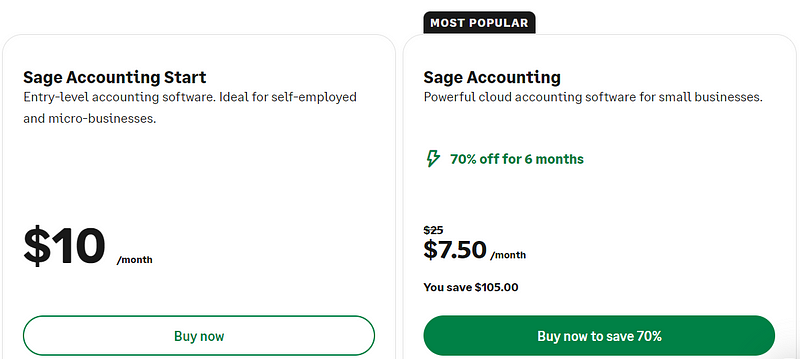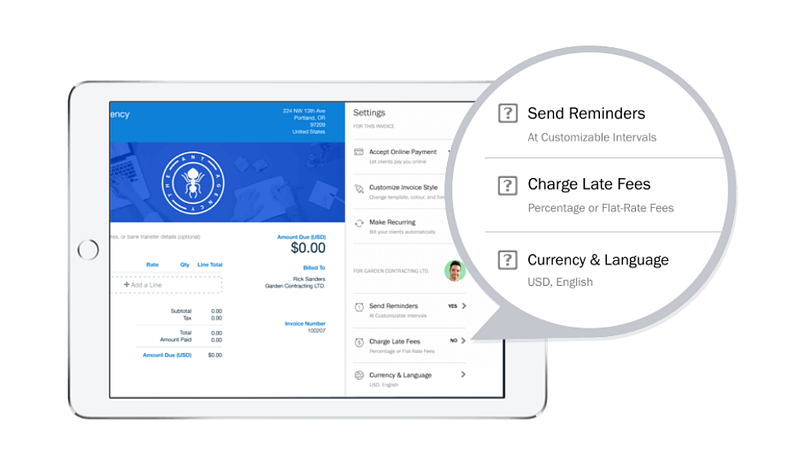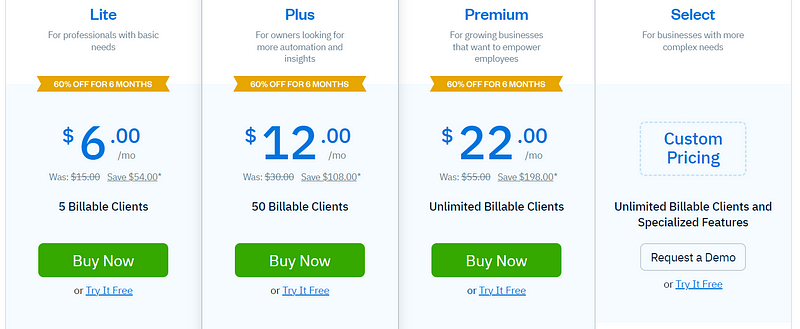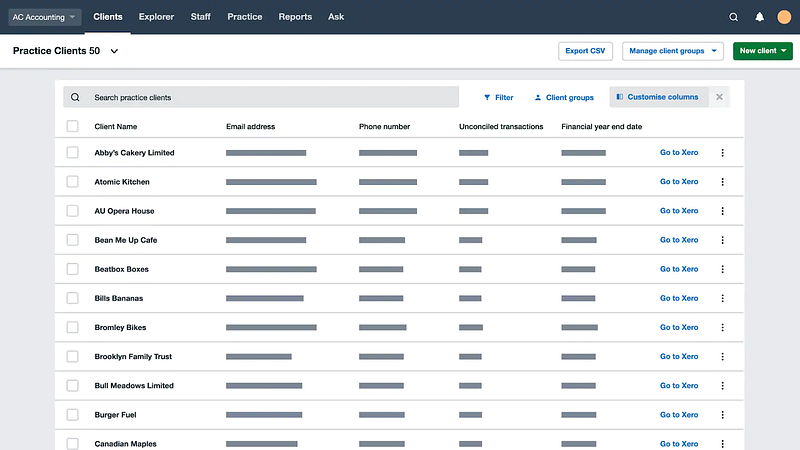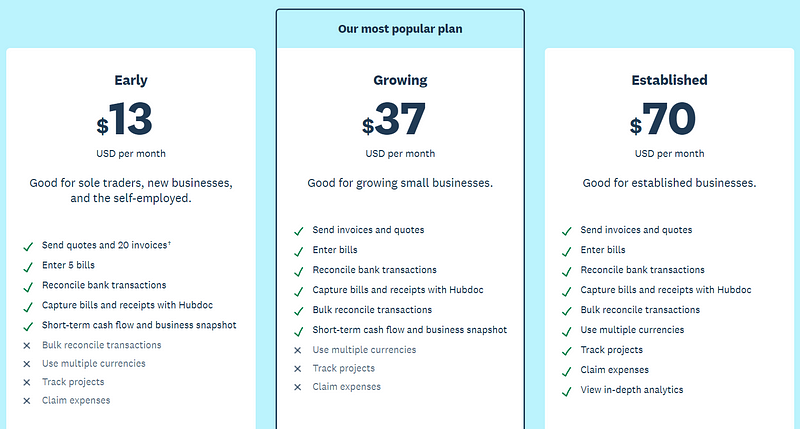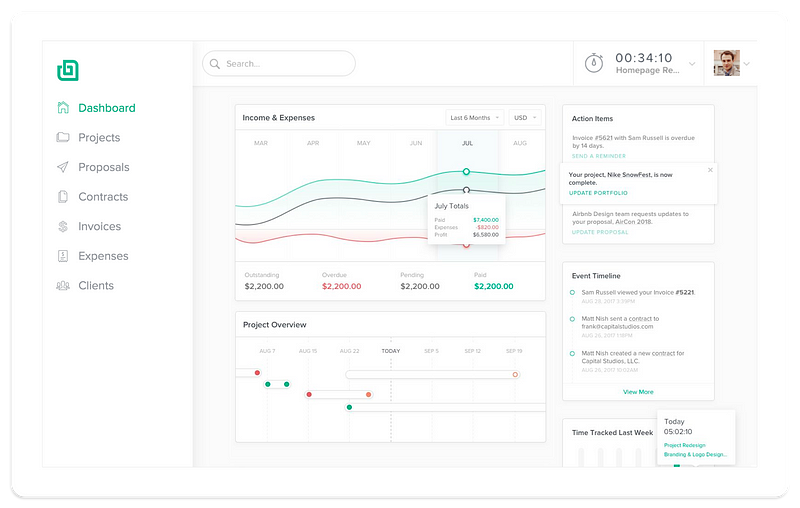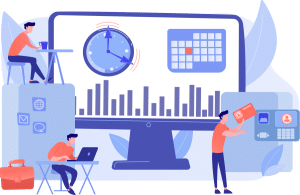The Best Accounting Software | Top 8 Reviewed And Compared For 2024
Efficient and accurate financial management is paramount for organizations seeking sustainable growth. With the best accounting software, you can streamline your company’s financial management, increase productivity and ensure regulatory compliance.
We’ve comprehensively researched and compared the 8 best accounting software programs on the market today. Read on to discover the features, strengths and potential drawbacks of tools like Zoho Books, Oracle NetSuite, and QuickBooks—so you can make an informed decision when choosing the best accounting software for your business.
Best Accounting Software for 2024 | Top 8 Shortlist
Following extensive research and drawing on industry expertise, we’ve compiled a carefully curated selection of accounting software options renowned for their robust functionality, scalability, and advanced features. Here are our picks for the top 10 best accounting software solutions that will empower your organization to navigate complex financial landscapes with ease:
- Zoho Books — Overall, the best accounting software for all kinds of businesses thanks to its automation, excellent workflow management and built-in portal for client collaboration.
- Oracle NetSuite — The top all-in-one business management tool offering accounting, ERP, and CRM software for large businesses.
- QuickBooks — A premier accounting software at an affordable price, ideal for small businesses looking to manage bank reconciliations, project and time tracking, and employee management all in one place.
- Sage — A leading accounting software for cloud-based expense management. It’s perfect for startups and solopreneurs as it’s simple to use and comes with support from expert accountants.
- FreshBooks — Best cloud-based accounting software for invoicing and billing with a robust range of accounting tools including built-in time tracking, vast currency support, and phenomenal integration capabilities.
- Xero — A popular tool for bank reconciliations and easily customizable invoices thanks to its 1,000+ integrations. Plus, it lets you have unlimited users and supports over 160 currencies.
- Bonsai — A comprehensive solution supporting accounting, taxes, CRM and project management. It’s ideal for freelancers and consultants looking to manage everything in one place without breaking the bank.
- Wave — The best free accounting software for small businesses looking to manage invoicing and accounting.
The Top 8 Accounting Software Programs | Reviewed
With a thoroughly saturated market, finding the best accounting software to help your business manage its finances easily and intuitively can be daunting. Below are our detailed reviews of the 8 best accounting software on the market today to help you make an informed decision:
1. Zoho Books — Overall, The Best Accounting Software in 2024
Zoho Books is part of the Zoho suite of online business applications, which is known for seamless automation and collaboration features. The accounting software is suitable for all businesses and comes with an intuitive interface, making it extremely easy to use.
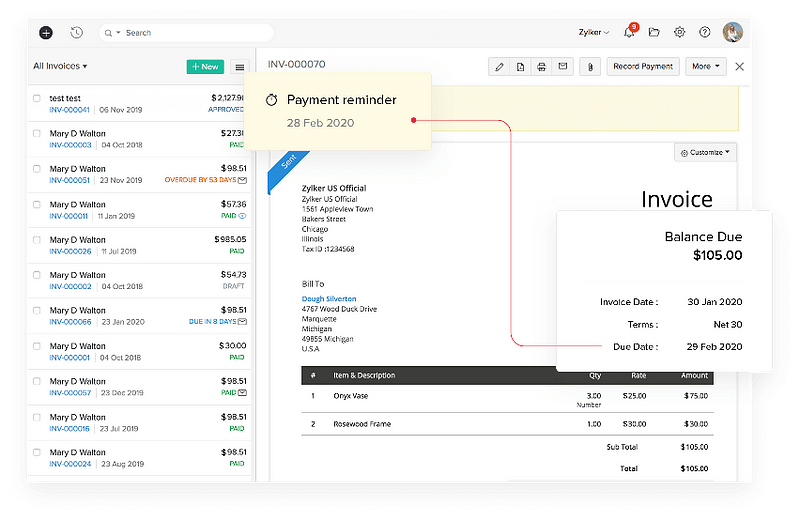
| Pricing | No. Of Users | Mobile App | Trial Version |
| $10.00/mo | 3 | Yes | Yes |
Workflow matters when you’re running a business, and accounting is no different. Zoho Books offers a suite of workflow automation features that can help you get your work done faster and with less hassle. For example, the software can automatically generate invoices when an order is placed, track billable hours, and send payment reminders to customers. It makes your accounting processes more efficient, so you can focus on running your business.
Zoho Books also offers excellent collaboration features. With the software, you can easily invite your accountant or bookkeeper to help you with your books. You can also give them limited access to specific areas of the software, so they can only see what’s relevant to their work. This makes it easy to get help when you need it and keeps your accounting team organized.
Moreover, Zoho Books boasts an intuitive dashboard and streamlined navigation, which makes it easy to manage invoicing, expense tracking, and inventory management. The software’s robust reporting capabilities and real-time insights empower businesses to make data-driven financial decisions.
Lastly, since Zoho Books is part of the larger Zoho suite, you can easily integrate it with other Zoho applications, such as the Client Portal. This gives you a complete view of your business and keeps all your data in one place. There’s no need to switch between applications or export/import data—it’s all right there at your fingertips. This makes for a much smoother experience and helps you avoid mistakes.
With flexible pricing plans catering to various business needs, Zoho’s affordability is a significant advantage. Unlike most other accounting software, Zoho offers a Free Plan with invoicing, bank reconciliation, and expense tracking for 1 user. If you run a larger business, you can upgrade to one of their paid plans, the least expensive of which starts at $10/month. Zoho offers six plans (including the free one): Overall, we think Zoho Books is the best accounting software program for businesses, big or small. It’s easy to use, offers excellent automation and collaboration features, and integrates with other Zoho applications. And if you’re just starting out, you can take advantage of their free plan. Oracle Netsuite is a comprehensive, all-in-one accounting software solution for large businesses. It offers a suite of features that includes financial consolidation and reporting, accounts receivable and payable, order management, inventory, project accounting, and fixed asset management. Not only that, it comes with an ERP and CRM system as well. With this software, you can manage your entire financial operations in one centralized platform. That includes real-time visibility into the financial health of the company, automated workflows to streamline processes, and built-in intelligence to make better decisions. It’s imperative for big enterprises to streamline their accounting processes and have complete visibility into their finances because it can help them avoid costly mistakes, make more informed decisions, and run their businesses more efficiently. With its seamless order-to-cash and procure-to-pay processes, Oracle Netsuite can help businesses accelerate their financial close and achieve real-time visibility into their cash position. You no longer have to worry about manually reconciling accounts or dealing with errors and discrepancies. This software will take care of it all for you. Not only is Oracle Netsuite great for financial consolidation and reporting, but it’s also excellent for managing projects and inventory. With its project accounting features, businesses can track project costs, revenue, and profitability in real time. Meanwhile, inventory management tools let you keep track of stock levels, reorder points, and lead times. This software makes it easy to manage all aspects of your business finances from start to finish. However, it’s important to note that Netsuite is best for use by large businesses, as its initial setup and implementation can be time-consuming and require ample resources. Additionally, as with any enterprise-level software, the cost can be a factor—Oracle Netsuite doesn’t offer a free trial. Unfortunately, Oracle doesn’t publicly disclose pricing for Netsuite. However, we’ve heard from users that it costs around $99 per month for the base package, which includes financial consolidation and reporting, accounts receivable and payable, order management, inventory, project accounting, and fixed asset management. If you need the ERP or CRM system as well, expect to pay an additional monthly fee. Contact Oracle today for a custom pricing quote; this might be the software you’ve been searching for. All in all, Oracle NetSuite is a reputable ERP solution that can effectively meet medium-to-large business’ needs. If you run a small or a startup business, this software might be a bit too comprehensive and expensive for your needs. But if you want to scale and grow your business, you need this one-stop-shop software solution. QuickBooks is a no-frills accounting software that is budget-friendly for small businesses. The software is designed to be easy to use, with a simple interface and straightforward features. QuickBooks is a good choice for small businesses that need basic accounting capabilities without the bells and whistles of more expensive software. It allows you to create and send custom invoices to your customers, which can be paid online, and track your expenses so you can stay on budget. If you’re a solopreneur, you will thank its invoicing feature come tax time. QuickBooks is cloud-based and available on both Mac, PC and mobile phones so that you can access your data from anywhere. This is a big plus if you travel a lot or work from different locations. You can easily run your business from your phone while on the go. You can also create and file 1099s for your contractors come tax time, which is a big time-saver for small business operators. Say you have a landscaping business and hire a few contractors throughout the year to help with busy periods. QuickBooks will let you create and file 1099s for those workers, so you’re all set for tax season. It will provide you with an easy-to-follow template and fill in the appropriate information for each contractor. What’s more is that QuickBooks can integrate seamlessly with your bank accounts and credit cards, so you can automatically categorize transactions and carry out bank reconciliation with ease. Not only does this feature save time, but it also reduces the chance of errors. Finally, QuickBooks generates insightful financial reports, providing a clear overview of your company’s financial health and helping you make more informed financial decisions. Pricing for QuickBooks starts at $15 per month, which is very affordable compared to other accounting software programs. For that price, you get unlimited invoicing, expense tracking and access to support from QuickBooks experts. You can also upgrade to a more expensive plan if you need additional features, such as inventory management or advanced reporting capabilities. Overall, QuickBooks is a top-notch accounting software that simplifies workflows and empowers businesses to maintain a strong financial foundation. The only downside is that it lacks some of the more advanced features that larger businesses require. But for small business owners on a budget, QuickBooks is hard to beat. Sage Business Accounting, formerly known as Sage One, is a cloud-based accounting software app designed for small businesses and startups, especially those in the world of e-commerce. What sets Sage apart from other accounting software is its focus on bill payments and management, which is critical for businesses that need to track inventory and sales tax. If you’re reviewing your finances every month, you might have encountered missing or duplicate transactions in your data. This is where Sage’s focus on bill payments really shines: it offers features to reconcile accounts automatically and prevent errors. Sage also offers various integrations, such as those with Shopify, PayPal, and QuickBooks, which makes it easier for businesses to manage their finances in one place. With Shopify, for example, businesses can connect their online store and automatically import sales data into Sage—which is then used to generate invoices, track inventory levels, and run reports. Simplicity is another of Sage’s standout features.The user interface is intuitive and easy-to-navigate, making it accessible to business owners without extensive financial backgrounds. Setting up the software is straightforward, and the onboarding process is smooth, so you can get up and running quickly. Lastly, Sage’s inventory management features are top-notch and ideal for businesses that need to keep track of stock levels, product pricing, and supplier information. Simply connect it to your Shopify store, for instance, and it will make sure you’re never out-of-stock on popular items. When the surge of customer demand hits, you’ll be prepared. When it comes to pricing, there aren’t a lot of options. The software is currently offered in two plans: Sage Business Cloud Accounting Start and Grow. The former is designed for businesses with up to 9 employees for $10.00 per month, while the latter is meant for businesses with 10 or more employees. Overall, Sage Business Accounting is packed with features that are designed to save time and prevent errors. However, you may need to get used to their dated interface which can slightly affect your productivity. FreshBooks will let you run your business from anywhere at any time. It’s an intuitive, cloud-based accounting software app that makes life easy for small business owners and accountants worldwide. This software’s most unique feature is its In-App Estimates and Proposals. This allows you to quickly create an estimate or proposal and send it directly to your client from within the software. If you want to succeed, setting clear and accurate expectations with your clients is vital, and this feature makes that process simpler than ever. It will show you which stage each proposal or estimate is in, so you can easily keep track of your sales pipeline. In addition to being able to manage your finances from anywhere, FreshBooks also gives you great insights into your business. The software tracks billable and non-billable time, so you can see where your team’s time is being spent. This information can be used to make better decisions about how to allocate your resources. Moreover, companies working with freelancers and contractors will appreciate this software’s invoicing features, which allow users to create professional invoices with customizable templates and easily track their status. Plus, FreshBooks enables automatic payment reminders, supports online remittance, and excels in expense tracking, so recording, categorizing and settling client bills is a breeze. You can also take advantage of its pre-populated chart of accounts, which is specific to your country or region. This ensures that your financial reports are compliant with local regulations. From account statements to balance sheets, you can trust that your reports will be accurate. Transparency is the key to success in business, and Freshbooks gives you the tools you need to succeed. Freshbooks offers three pricing plans, which are: With Lite, you can manage up to 5 clients and send unlimited invoices. Plus gives you the ability to track billable and non-billable time and create proposals and estimates. Premium gives you all of these features, plus allows you to track project profitability and more. If you operate a large business and need to add more clients and users, contact Freshbooks and ask about its Select plan for custom pricing. Whether you’re a solopreneur or have a team of employees, Freshbooks could well be the best cloud accounting software for you. The only thing it lacks is the ability to budget, but it makes up for that with its other features. If you’re looking for easy-to-use accounting software that will give you insights into your business, Freshbooks is the way to go. If you need a more robust time tracking provider, check out our list of the best employee time tracking software here. Xero is an online accounting software program that connects directly to your bank account, making it easy to reconcile transactions and keep track of your spending. It also offers over 1,000 integrations with other business software, so you can customize invoices and other documents to match your brand. Since it’s cloud-based, you don’t have to go through the hassle of installing and updating software on your computer. It won’t take up valuable space on your hard drive, either. All you need is an internet connection and you can access your account anywhere, anytime. If you ever lose or damage your computer, all your data will still be safe and sound in the cloud. And if that isn’t enough flexibility, Xero’s mobile app gives you real-time access to critical financial information straight from your phone or tablet. Xero also has its own marketplace for add-ons which can automate many of your business processes, from payroll to expense claims. This makes it easy to find solutions that work for your business, without having to piece together different software programs. Lastly, if you’re running a business with multiple locations or employees, Xero can streamline your global transactions, invoices and expenses thanks to its impressive ability to support 160 currencies. With this feature, you can easily ensure accurate financial records and eliminate the hassle of currency conversions. Xero makes it easy to track and manage your finances in one central place. It can help you manage your payroll, making sure that everyone gets paid on time and that you’re complying with tax laws. Your employees can access your employee portal and lodge timesheets, expense claims, and leave requests. While Xero is not the cheapest accounting software on the market, it does offer a free trial and a competitive monthly price for small businesses. It has three pricing tiers: Early, Growing, and Established. The Early plan is suitable for businesses with 0-5 employees and starts at $13 per month. The Growing plan is designed for businesses with 6-10 employees and starts at $37 per month. The Established plan is perfect for larger businesses with 11 or more employees and starts at $70 per month. One downside of Xero is that it can be pricey compared to other accounting software. However, its many features and integrations may be worth the extra cost for some businesses. Bonsai is one of the newer accounting software programs on the market. Despite its relative newness, it has already established itself as a go-to solution for many freelancers and independent contractors. One of the main reasons for this is that Bonsai isn’t just an accounting tool—it’s a comprehensive solution designed specifically to address independent professionals’ multifaceted needs. From contract regulation to client relationship management, Bonsai provides a holistic approach to handling freelance business operations. Rest assured, however, that your accounting needs will not be an afterthought with this tool. One of the things that makes Bonsai so popular is its proposal creation feature, which allows users to quickly and easily create proposals and contracts that can be sent to clients. The proposal and contract maker is especially useful for those unfamiliar with these documents’ legal aspects. You can guarantee that what you will be sending your client is airtight. Another of Bonsai’s great features is its time-tracking capabilities. This is an essential tool for many freelancers, as it allows them to track the time they spend on each project. This information can then be used to generate invoices that accurately reflect the work that has been done. No more over- or under-billing your clients. Finally, Bonsai offers a fantastic support system. The team behind the software is always available to answer any questions you may have. They also offer a range of helpful tutorials and articles, so you can learn how to use the software to its full potential. As mentioned, there is a free version of Bonsai available. However, this version is very limited in terms of features and functionality. If you’re running a business, you will need to upgrade to one of the paid plans. The paid plans start at $24 per month ( billed annually) for the Starter plan. This plan includes all the basic features, such as invoicing, time tracking, and proposal and contract making. It also includes a CRM that can be used to manage clients and projects. For businesses that need a more comprehensive solution, there is the $39 per month (billed annually) Professional plan. This plan includes everything in the Starter plan, plus additional features such as double-entry bookkeeping, project budgeting, and advanced reporting. If you’re looking for an accounting software solution that is tailored specifically for freelancers and independent contractors, Bonsai is definitely worth checking out. However, it should be noted that the free version of the software is fairly limited. If you’re running a business, you will likely need to upgrade to one of the paid plans. Wave offers a comprehensive suite of tools ideal for simplifying financial management for small businesses. Its main selling point is that, unlike other tools on this list, Wave’s accounting and invoicing tools are completely free to use. The budget-friendly price point doesn’t mean Wave skimps on quality, though: With a user-friendly interface and diverse functionality, this tool stands out as an excellent choice for entrepreneurs looking to streamline their financial processes. Wave provides a range of accounting tools, including invoicing, expense tracking, seamless integration with popular payments processors such as PayPal and financial reporting. It makes creating and sending professional invoices effortless, and it also allows users to easily customize invoice templates to reflect their brand identity. Thanks to the ability to upload receipts, expense tracking is made simple with Wave. The software can also categorize expenses and generate detailed reports for accurate financial analysis. Finally, the financial world is your oyster with Wave’s reporting features. Users can generate myriad reports, such as profit and loss statements, balance sheets, and cash flow statements—offering three-dimensional insights into your company’s financial health. Budget certainly won’t prevent you from opting for this accounting tool: Its invoicing and accounting tools are free, forever, with no trials, subscriptions or hidden fees. If you’re interested in accessing Wave’s payroll features or connecting with one of their financial advisors, you will need to pay a monthly fee. Wave charges a base of $40/month for payroll processing, plus $6/month for each active employee. Bookkeeping support starts at just under $150/month, with additional options for payroll coaching available. In short, Wave is an incredible value for your money—given that you don’t need to spend any to use the majority of its comprehensive accounting tools. With seamless payment integration and robust reporting, Wave is an excellent choice for entrepreneurs and small business owners with limited budgets who are seeking a user-friendly and cost-effective solution to their financial needs. If you want to run your business smoothly, you need to have good accounting software in place. This will help you keep track of your finances, invoicing, and expenses. To give you a simpler picture of these accounting software options, check out our head-to-head comparison table of the 8 best online accounting software. The only correct answer to this question is yes. We live in a digital and fast-paced world, and if you’re not taking advantage of these technologies for your business, you’re falling behind. Here’s why: In the past, businesses could get by without accounting software. They would use paper and pencil to track their finances. However, this is no longer the case. If you want to do business in today’s world, you need accounting software. There are a few reasons for this: First, most businesses now use some form of online banking. This means that your bank statements are no longer coming to you in paper form. You need to be able to download them and input them into your accounting software. Second, businesses are now required to file their taxes electronically. This means that you can no longer get by with just a paper return. You need accounting software in order to file your taxes electronically. Third, more and more businesses are starting to accept credit cards. If you want to accept credit cards, you need to have some way of processing them. Accounting software will allow you to process credit cards and track your finances. If you still use paper and pencil to track your finances, you’re wasting a lot of time. Accounting software will save you time by automating many of the tasks that you would otherwise have to do manually. For example, most accounting software can automatically download your bank statements and credit card transactions. This means that you don’t have to input this information manually. In addition, accounting software can automate many of the tasks involved in preparing your taxes. This means you will spend less time preparing your taxes if you use accounting software. If you want to make good decisions for your business, you need to have access to accurate financial information. Accounting software will give you the ability to track your income and expenses so that you can see where your money is going. This information will help you make better decisions about how to spend your money. Accounting software is designed to be easy to use, even if you have no experience with accounting. Most accounting software programs come with tutorials and support so that you can get started quickly. So, if you’re not using these digital solutions, such as accounting software for your business, you should be. It will save you time and money and help you make better decisions. With thousands and thousands of accounting software programs available today, it can be difficult to choose the best one for your business. When making your decision, there are a few key factors you should consider in order to find the best accounting software for your business needs. The best accounting software is the software that is easiest for you and your employees to use. If the software is difficult to use, it will take your employees longer to input data and generate reports, which can cost your business time and money. You should also make sure that the accounting software you choose is compatible with the other software programs you use in your business. For example, if you use QuickBooks for bookkeeping, you will want to make sure that the accounting software you choose can integrate with QuickBooks. The best accounting software will also have robust reporting features. You should be able to generate reports that give you insights into your business finances so that you can make informed decisions about where to allocate your resources. Finally, you should consider pricing when choosing the best accounting software for your business. Some software programs are more expensive than others, but the price is not always indicative of quality. You should compare the features of each software program to find the one that offers the best value for your money. Managing your finances, whether you’re an accountant, a business owner or a freelancer, can be a difficult and time-consuming task. That’s why finding the best accounting software is essential to keeping your business running smoothly. We carefully chose these accounting software programs based on a variety of factors, including features, price, ease of use, and customer support. Zoho Books is our top pick for the best accounting software because it has a wide variety of features, including invoicing, expense tracking, and inventory management. Plus, you’ll be surprised once you see how your productivity and efficiency will improve when you use this accounting software, thanks to its advanced automation and robust integrations. It offers a free account, suitable for businesses with less than 50k income per year, while you can also get a free trial for 14 days to test out the software before committing to a paid plan.Pros
Cons
Pricing
2. Oracle NetSuite — The Top All-in-One Business Management Tool For Large Businesses
Pricing
No. Of Users
Mobile App
Trial Version
Not Published
Unspecified
Yes
Yes
Pros
Cons
Pricing
3. QuickBooks — A Premier Accounting Software at an Affordable Price
Pricing
No. Of Users
Mobile App
Trial Version
$5.10/mo
1
Yes
Yes
Pros
Cons
Pricing
4. Sage — A Leading Accounting Software for Cloud-Based Expense Management
Pricing
No. Of Users
Mobile App
Trial Version
$10.00/mo
1
Yes
Yes
Pros
Cons
Pricing
5. FreshBooks — Best Cloud-Based Accounting Software For Invoicing and Billing
Pricing
No. Of Users
Mobile App
Trial Version
$6.00/mo
5
Yes
Yes
Pros
Cons
Pricing
6. Xero — Top-Notch Accounting Software With 1,000+ Integrations and 160+ Currencies
Pricing
No. Of Users
Mobile App
Trial Version
$13.00/mo
Unlimited
Yes
Yes
Pros
Cons
Pricing
7. Bonsai — A Comprehensive Solution for Freelancers’ Accounting Needs
Pricing
No. Of Users
Mobile App
Trial Version
$13.00/mo
Unlimited
Yes
Yes
Pros
Cons
Pricing
8. Wave – The Best Free Accounting Software for Small Businesses
Pricing
No. Of Users
Mobile App
Trial Version
Free
Unlimited
Yes
Yes
Pros
Cons
Pricing
The 8 Best Online Accounting Software | Compared
Software
Pricing
No. Of Users
Mobile App
Trial Version
Zoho
$10.00/mo
3
Yes
Yes
Oracle Netsuite
Not Published
Unspecified
Yes
Yes
QuickBooks
$5.10/mo
1
Yes
Yes
Sage Accounting
$10.00/mo
1
Yes
Yes
FreshBooks
$6.00/mo
5
Yes
Yes
Xero
$13.00/mo
Unlimited
Yes
Yes
Bonsai
$24.00/mo
Unlimited
Yes
Yes
Wave
Free
Unlimited
Yes
Yes
Do I Need Accounting Software for My Business?
You Can’t Do Business Without It
It Will Save You Time
It Will Help You Make Better Decisions
It’s Easy to Use
Factors to Consider When Choosing the Best Accounting Software
Ease of Use
Compatibility
Reporting
Pricing
Accounting Software FAQs
Which accounting software is easiest to use?
What’s the best accounting software in 2024?
Is accounting software safe?
What’s the best free accounting software?
What software do most accountants use?
Can I use Excel for bookkeeping?
Conclusion | What’s the Best Accounting Software in 2024?
Our Editorial Process


